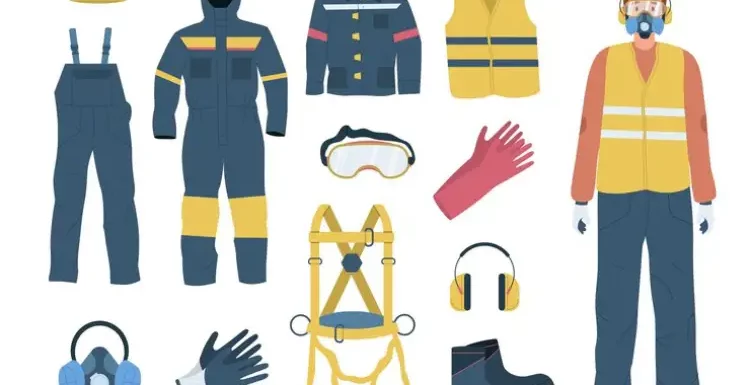
Personal protective equipment (PPE) plays a vital role in keeping employees safe and businesses compliant with health and safety regulations. For UK business owners, providing adequate PPE and ensuring it is used properly should be a top priority. With around 1.1 million working people suffering from work-related illnesses each year, failing to protect staff can lead to lost productivity, absenteeism, fines and even prosecutions. This article will explore what PPE is, why it matters, legal responsibilities around PPE, and the business case for investment in PPE.
What is PPE?
Personal protective equipment (PPE) refers to protective clothing or other equipment that is designed to protect employees from injuries or infections while at work. PPE creates a barrier between hazards and the wearer, whether those hazards are physical, chemical, biological, environmental, or electrical in nature. Examples of PPE include safety glasses, high-visibility clothing, safety footwear, hard hats, hearing protection and respiratory protective equipment. Employers have a duty to provide adequate PPE, free of charge when risks to health and safety cannot be controlled by other means.
Why PPE Matters
- Preventing Harm – The main purpose of PPE is to prevent or reduce harm from hazards employees face in their jobs. For example, construction workers require sturdy boots, hard hats, and high-visibility vests; healthcare workers need gloves, gowns, and masks to protect against infectious diseases. PPE suitable for the job and workplace can eliminate or reduce injuries, illnesses, and fatalities.
- Legal Compliance – UK health and safety law obligates employers to properly control risks. If risks remain after implementing other controls, adequate PPE must be supplied. Breaches of PPE rules can lead to enforcement action including fines over £100,000 or even prison sentences.
- Productivity and Profits – Accidents, exposures and resulting illnesses burden businesses with costs related to medical treatment, higher insurance premiums, employee absence, recruitment/training, and compensation claims. Investing in PPE enhances prevention, boosting productivity. The UK economy loses over £15 billion annually from work-related illnesses alone. Effective PPE reduces this financial toll.
- Reputation and Relations – Providing PPE demonstrates that a company cares about employee wellbeing. This supports recruitment, retention, and workforce morale. Poor PPE risks backlash from employees, regulators, media, and customers in today’s interconnected world. No business wants to end up with a reputation for neglecting safety.
Employer Responsibilities
As the law states, employers hold responsibility for employee PPE. Key rules include:
- Conduct risk assessments covering all workplace hazards requiring PPE use.
- Select appropriate PPE certified to recognised standards.
- Provide required PPE and replacements free of charge.
- Train employees on proper use and maintenance of PPE.
- Enforce PPE policies through workplace monitoring and supervision.
- Maintain, clean and store PPE according to manufacturer guidance.
Employee Duties
While employers determine PPE needs, employees must also meet requirements:
- Properly wear PPE as directed.
- Inspect and care for PPE according to training.
- Request new PPE when items are damaged or defective.
- Inform supervisors of PPE-related concerns or deficiencies.
- Participate in all necessary PPE-related instructions and training.
The Business Case for Investing in PPE
- Financial Savings – Spending on quality PPE pales in comparison to the costs of workplace injuries and illnesses in compensation claims, insurance premium hikes and legal fees. This is especially true with severe incidents. The Health and Safety Executive found the average cost for a single fatal injury is £1.6 million, while the average disabling injury exceeds £12,000. Investing more in preventing harm with PPE saves significant money down the road.
- Increased Productivity – Because PPE protects health and prevents injury downtime, it helps minimise workforce absence and staff turnover. There is no loss of experience while avoiding recruitment and retraining expenses for replacements. Greater preparedness and protection mean employees can sustain peak productivity. By one estimate, UK businesses lose over 175 million working days annually due to work-related illness and injury. Ergonomic PPE-like tools reducing strain, or non-slip shoes even boost productivity.
- Regulatory Compliance – Following PPE rules shows regulators that a business takes legislation seriously during inspections or incident investigations. That earns cooperation credit with enforcement agencies like the Health and Safety Executive or local authorities. Lapses like inadequate PPE risk enforcement action costing money and reputational damage, which prudent companies avoid.
In our safety-conscious era, responsible employers understand the importance of utilising PPE to shield employees from common workplace hazards. Far more than just goggles and gloves, today’s high-tech PPE allows once-dangerous jobs to be conducted securely.
